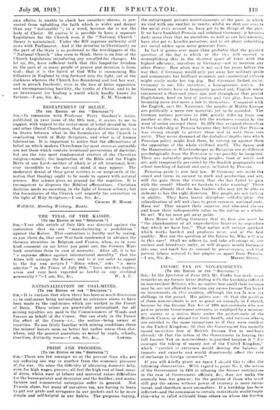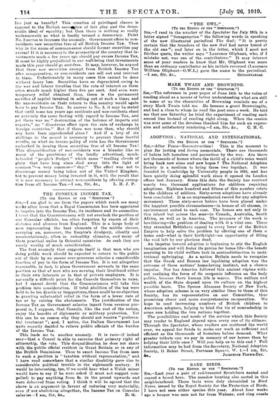INCOME TAX ON NON-RESIDENTS.
(To THE EDITOR OF TOE "SPECTATOR."]
SIR,—In time Spectator of June 28th Mr. Coxbn has made some. remarks on my former letter dealing with time hardship lint ict,e1 on non-resident Britons, who, no matter how small their incomes may be, are not allowed to reclaim any excess Income Tax levie on investments in -this country, although time tax is now six shillings in the pound. His points are: (1) that the position of these non-residents is not so great an anomaly as I stated, because by time Income Tax Act of 1913 non-residents who are past or present Government servants, or employed by a mission- ary Society or a native State under the protectorate-of the British Crown, or abroad for their health, and various others, are entitled to the same exemptions as if they were resident in the United Kingdom; (2) that the Government has recently issued securities free of British Income Tax to residents abroad; (3) that the action of the Government in levying the full Income Tax on non-residents is justified because it " dis- courages the taking of money out of the United Kingdom,- which "carried to extremes would destroy the balance of imports and exports and would disastrously affect the rate of exchange in foreign countries."
If you will kindly grant me space I should like to offer the following observations. With regard to point No. 1, the action of the Government in 1918 in relaxing the former restrictions in the case of Government officials, Sic., does not mike the anomaly less, but greater; • for the position of those who must still pay -the excess without power of recovery is more excep- tional, and therefore more anomalous. If a hardship has been inflicted—and the concession- to certain individuals v/ould-imply this—why is relief withheld from others on whom the but-den
lies just as heavily? This creation of privileged classes is opposed to the British coneekt.ion of fair play and the demo- cratic ideal of equality; but then there is nothing so really undemocratic as what is fondly termed a democracy. Point No. 2 serves to increase the anomaly. Government offers to non- residents new securities free of all British Income Tax. Then why in the name of common-sense should former securities pay excess? If it is necessary to the prosperityof the country that in- vestments made a few years ago should pay excess Income Tax, It must be highly prejudicial to our well-being that investments made this year should go scot-free. It may, however, be argued that these new securities exempt from British Income Tax offer compensation, as non-residents can sell out and reinvest in them. Unfortunately in many oases this cannot be done without heavy loss. Securities have so depreciated owing to the war and labour troubles that the rate of interest on them often stands much higher than five per cent. And even were temporary relief obtained thus, there is the permanent sacrifice of capital involved in selling out at such a time; and the non-residents on their return to this country would again have to pay Income Tax. In answer to No. 3, it may be stated that until some ten years ago residents and non-residents stood on precisely the same footing with regard to Income Tax, and yet there was no "destruction of the balance of imports and exports," no "disastrous effect upon the rate of exchange in foreign countries." But if there was none then, why should any have been apprehended since ? And if a levy of six shillings in the pound is necessary to prevent these fearful results, on what an insane policy of ruin has the Government embarked in issuing those securities free of all Income Tax! This disqualification of non-residents was a blunder like so many of the provisions of the loudly advertised, much- helaucled "people's Budget" which came "trailing clouds of glory that have long since died away into the light of common "—a very common—" day." The effect was not to discourage money being taken out of the United Kingdom, but to prevent money being invested in it, with the result that it is now necessary to attract non-residents by offering exemp- tion from all Income Tax.—I am, Sir, &c., L. H. J. P.



































 Previous page
Previous page